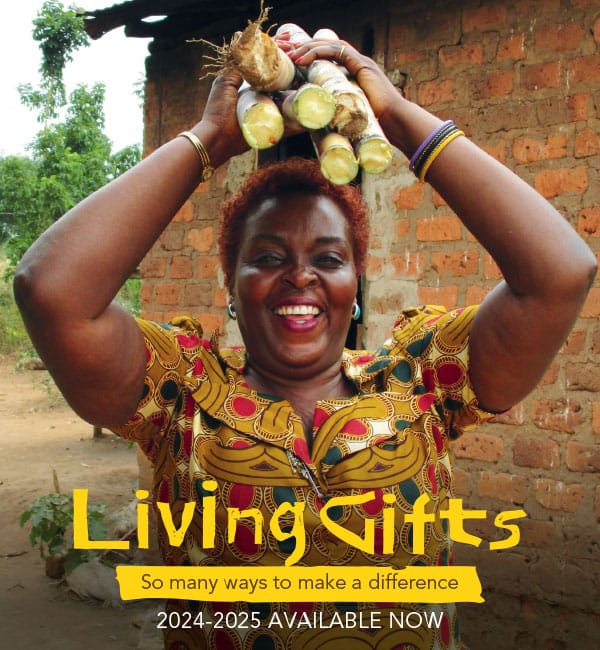Tamil Nadu, South India
Evaluation in Tamil Nadu
Funded by Australian Aid and Quaker Service Australia.
Evaluations are a significant tool for development agencies, providing as they do valuable learning for the project partner staff as terms of reference and processes are discussed, giving feedback on the impact of resources and training provided, and ultimately, the impact and changes to the lives of the people participating in the project. However, like all good assessments, the terms of reference are key to obtaining this relevant information accurately, and ideally, the evaluation is built into the overall design of the project so that it is intrinsic rather than a last minute add-on.
Tamil Nadu in southern India has, along with many other organisations, experienced substantial set-backs in the past couple of years – COVID outbreaks and resultant government prohibitions on travel and large scale gatherings; extreme weather events such as long term flooding preventing travel to and from the project site, adversely impacting on agricultural activities and ruining crops, and for cattle standing in flood waters, the danger of disease; and overall stress and ill-health as a result of all this within the communities and project partner staff. As a result, the planning and selection of an external team to conduct the evaluation took far longer than was envisaged, a situation however which is not unique to Tamil Nadu project partners.
A team from Vellore Institute of Technology in Chennai, Tamil Nadu led by V Vijayalakshmi was the final choice to undertake this evaluation. The overarching objectives of the project which formed the basis for the evaluation examined the sustainability and impact of the project over the last five years working within a predominantly rural population, a third of which belong to Scheduled Castes. The majority of the participants rely on agriculture, growing subsistence crops and smaller areas set out with fruit as a cash crop.
The evaluation team used a mix of qualitative and quantitative research methods, focus groups and individual interviews so as to secure verification or ‘triangulation’ of results. They interviewed
- adults who have received training in organic farming techniques,
- women who have, as a result of training and support provided, become entrepreneurs in the making and marketing of herbal medicines and nutritional supplements,
- women who have propagated and cared for tree seedlings which are sold to community groups wanting to re-green their environment,
- school students who have received training in environmental awareness and care,
- students who have created food gardens to supplement the midday meal provided at school
- Eco-Club students
‘We enjoy working together in the school garden’
‘I feel it is my responsibility to plant the tree properly’
‘Its our belief that as we grow, the tree will also grow along with us. Our unity and friendship will be continued as long as the tree lives’.
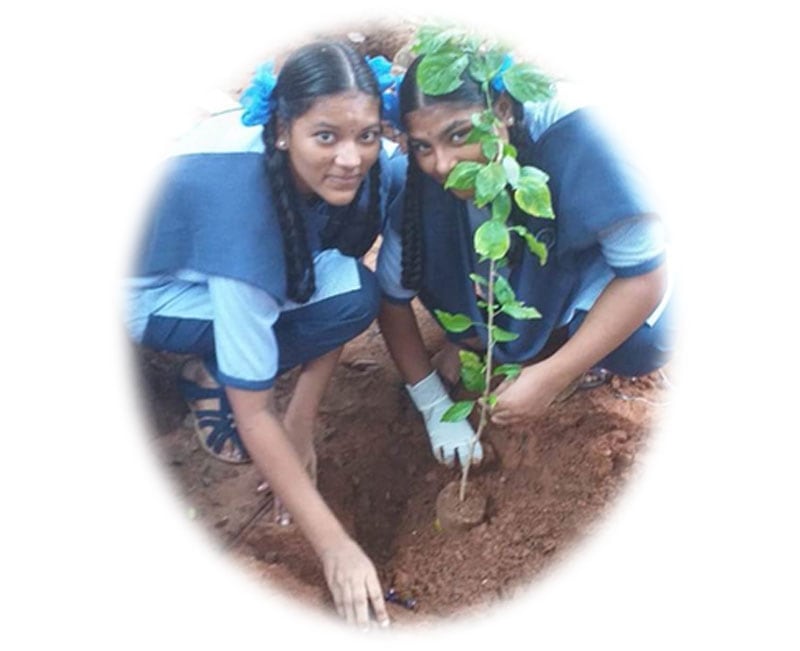
Students planting trees for shade in the school playground. Photo credit V Vijayalakshmi
Nadukuppam School has become a model and an example for other schools nearby. The staff of the project partner Pitchandikulam Bio Resource Centre have assisted these students , made them aware about natural resources through applied learning, creating ‘Green Corners’ to display their knowledge of the local flora and fauna, creating Eco-Clubs in schools, and enabling students to demonstrate their growing awareness, confidence and skills.
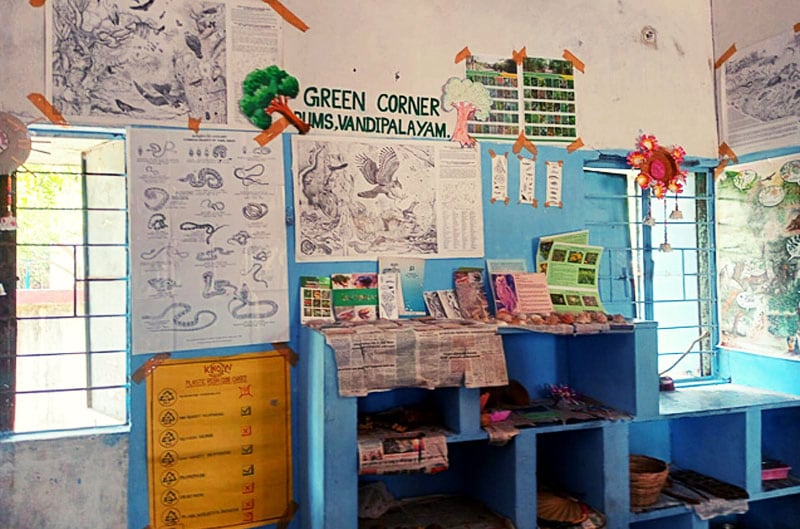
Classroom Green Corner, Tamil Nadu. Photo credit V Vijayalakshmi
The project has been training a group of women over a number of years to create a range of products – herbal medicines and food supplements such as chutneys and sauces, plants and tree seedlings, herbal veterinary products, and spirulina. The training involves accurate identification of the indigenous herbs, how to make the products and how best to use them to improve health and wellbeing. Regular health camps enable communities to see a Siddha doctor and receive herbal treatment at a subsidised price, and animal health camps help to maintain the health of their animals in a region where usually veterinary care is expensive, requires transportation of the sick animal to the vet, and so is often not possible to relieve the animal’s suffering.
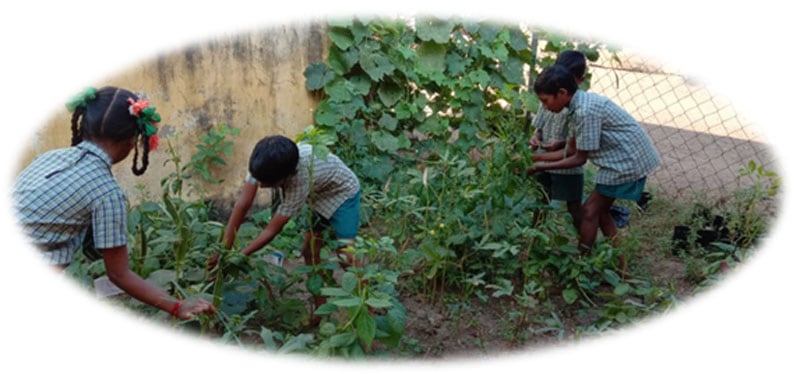
Collecting herbs for production into remedies for sale. Photo credit V Vijayalakshmi
In collaboration with Sustainable Enterprise Development in the Auroville Bioregion (SEDAB), PBRC has established Meera Herbal Food, a unit which collects medicinal plants and processes them into food products which the women of the unit sell among the local villages. Another unit, Amirtha Herbal Medicines uses indigenous herbs and processes them into herbal remedies, sold in local markets. Workshops given by PBRC staff member Parvathi who is fully trained in the use of herbs and has received regional and national awards for her work, enables the women to understand their craft, support and conserve local medicinal knowledge and resources, and has given the women of these units the confidence and skills to sell their products .
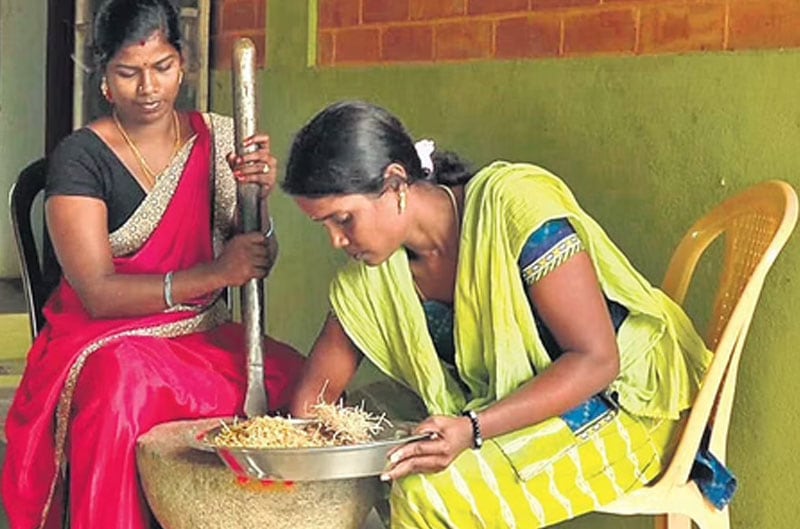
Making herbal remedies in Tamil Nadu. Photo credit – V Vijayalakshmi
‘In the beginning I was discouraged by my family to work with Amirtha Enterprise. Later on the importance of my work was recognised and now all in my family support me’.
‘I am working with Meera Enterprise; my financial need is met, I am able to pay my children’s academic fees’.
‘I am respected among family members because it’s a privilege for me to be working in Amirtha Enterprise and reaching the community to address their health issues, where I am respected as a working woman as well as a Traditional medicine healer’.
Many village women from self-help groups have been trained in basic tailoring skills, however it leaves them to set up their own tailoring units at home or to be employed in garment factories for long hours during the day. For PBRC, the training course provided goes beyond tailoring skills, and includes the design process, different types of stitching and encourages the formation of business collectives.
‘I got benefit from the tailoring training. I have started stitching clothes for myself as well as for others and I am always appreciated for my work. This helps build my confidence in me and also helpful for my survival.’
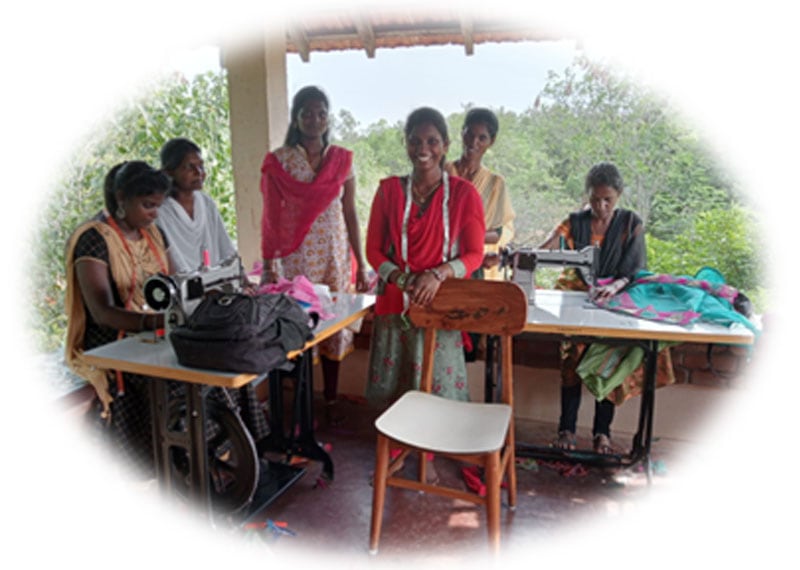
Tailoring class in Tamil Nadu. Photo credit V Vijayalakshmi
Training for local farmers is including organic agriculture, agro-forestry, and benefits of alternative energy using solar and wind turbines for example to pump water up to the surface. Crops new to the area, such as varieties of rice and different ways of planting , the benefits of using vermi-compost and effective micro-organisms, and natural pest and disease treatments have all helped increase crop yields and family income.
From the quotes included in this report, it is clear that for the participants themselves, and for their families, there have been improvements to family health, wellbeing and increased income from the sale of their produce. The evaluation report also made some recommendations for how the project could achieve even greater results, which have been considered and built into the following project design. These recommendations include
- Increasing the reach of environmental education among the Eco-Clubs with peer tutoring (this year’s project is including the production of school environmental newsletters)
- Increasing the number of women trained in the use of traditional medicinal herbs and able to set up a small dispensary in their home (this has been included in the current project)
- Additional training in entrepreneurial skills – this is currently including the use of social media to share the information about herbal products more broadly
- Increasing crop yield via organic methods to sustain the soil, enhance biodiversity and increase income potential as organic produce can be sold at a higher price locally in the markets – this is occurring along with discussions about the process of securing organic certification
- Raising awareness of the benefits of organic manures as a product for commercial sale, incorporating a variety of components such as sugar cane stubble, green manure crops added to animal waste products. This is also included as a component in the organic farming training course.

For many of the overseas projects, additional funds have been sourced from the Australian Government’s Department of Foreign Affairs and Trade, or DFAT under the Australian NGO Cooperation Program funding.

For many of the overseas projects, additional funds have been sourced from the Australian Government’s Department of Foreign Affairs and Trade, or DFAT under the Australian NGO Cooperation Program funding.
Children’s Rehabilitation, Education and Social Empowerment Trust (CREST) in Tamil Nadu, South India.
$4711 from QSA’s own funds.
Safe drinking Water
This project has provided safe and clean drinking water to three remote rural villages in Tamil Nadu. It required secure bore wells to be drilled, at sites assessed as being suitable. In addition, training has been provided for key staff of the organisation about water management and hygiene and sanitation knowledge, which was then shared with the community. Each of the three communities have created a village water community and received training in efficient and effective management of water, how to prevent water borne diseases and personal hygiene and cleanliness.
New community water access, linked to vegetable plots for irrigation, and water diviner who successfully located the water source. Photo credit: CREST Trust

For many of the overseas projects, additional funds have been sourced from the Australian Government’s Department of Foreign Affairs and Trade, or DFAT under the Australian NGO Cooperation Program funding.

For many of the overseas projects, additional funds have been sourced from the Australian Government’s Department of Foreign Affairs and Trade, or DFAT under the Australian NGO Cooperation Program funding.
Pitchandikulam Bio Resource Centre, Tamil Nadu, South India.
Funded by QSA and DFAT $82,606
Integrated village rural development in Tamil Nadu
Project results
This project has environmental sustainability as its key focus. Indigenous tree seedlings have been germinated from locally sourced seeds and a total of 15,500 trees were planted to revitalise and recreate traditional tropical dry evergreen forest areas. Five classroom presentations were prepared this year and shared with 417 teachers as part of in-service training. Over 3,000 students attended environmental education classes and exposure visits to Pitchandikulam Forest, and 2,800 students took part in weekend activities through Eco-Clubs.
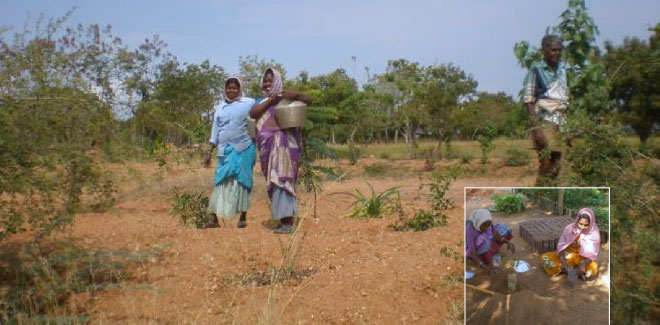
Preparing for a new batch of seedlings and watering the newly planted tree seedlings in the reforested areas, Tamil Nadu. Photo credit: QSA
Enhancing sustainable livelihoods is also key to this project and initiatives created previously involving the growing and use of herbs, a plant nursery and spirulina production have been merged into the Common Facilities Centre. 45 women are involved in the centre and have been upskilled in effective rural marketing and enterprise management. The centre has enabled the sharing of resources and collaboration in the production and sale of herbal based chutney, pickles and nutritional supplements, as well as a range of herbal medicine preparations and creams. Increased sales have been generated by exposure at local, state and national events.
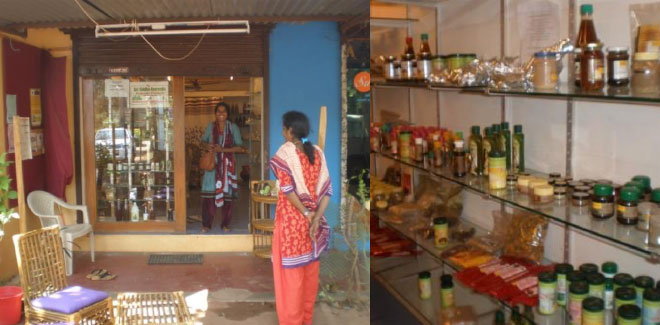
Regular sales of herbal products made by the women involved in the Amirtha Herbal medicine, Meera Herbal Food and Spirulina units through a local shop, local events, health and cattle camps and conferences. Photo credit: QSA
Additional use of locally grown herbs and herbal medicine products have been prescribed by professional doctors at health camps where 242 people were treated with subsidised remedies, and over 400 cattle were treated by veterinarians at cattle camps.
The project has also been able to significantly reduce child malnutrition with the provision of a twice daily health drink supplement based on locally grown herbs and organic grains and vegetables. 63 children are receiving the supplement and have been assessed regularly for height/weight ratio and blood count. During the year improvements have meant that some children are healthy enough to no longer need the supplementation.
Challenges
There is the challenge of political change and civil unrest which occurs around the time of commune and national elections. As always when elections are held, such as in late 2016, the project partner will cease project activities for some time before, during and after the election to ensure there is no wrong association linking project activities with political events; strict impartiality is maintained by keeping a distance from such events.
The relocation of teaching staff within Tamil Nadu means that there are always new teachers to learn and receive in-service training. It is however an advantage also in that the materials provided by the project partner are reaching new schools than perhaps was originally considered possible. For the women who are involved in the community enterprises, family members are not always supportive of their new-found confidence, income and abilities. Workshops and group discussions have helped the women to feel comfortable to address potential issues and continue their work. Their uniform saris give them a degree of visible status within the community. Some have even taken the leap to start their own independent enterprises.
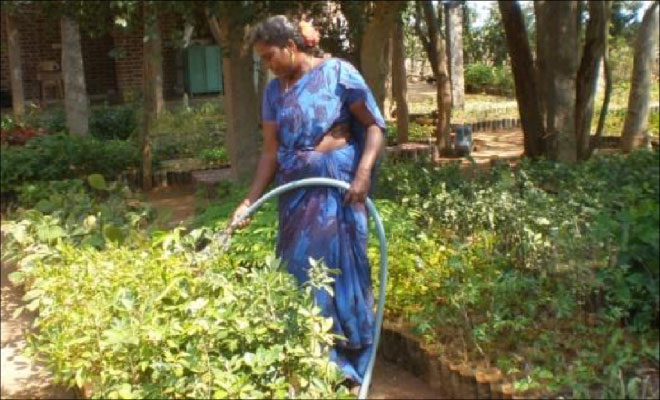
Regular watering of the tree seedlings ensures a good survival rate. Photo credit: QSA
Water supply for the plant nursery enterprise and agricultural demonstration sites has proved a challenge this year. QSA was able to repair a windmill, provide safety systems for a bore-well and other water improvements to make the water supply more assured. Support is also being provided to assist the women growing spirulina address the marketing challenges of their product.
Vasandham Society, Tamil Nadu, South India.
Funded by QSA and DFAT $24,770
Promotion of environmentally friendly and traditional agriculture in Tamil Nadu
Project results
Vasandham Society has established demonstration sites of water management techniques such as contour bunds, overflow channels and water storage methods. In addition 20 varieties of traditional grains have been grown; azolla – an aquatic plant that can be effectively used as cattle fodder has been successfully demonstrated; and the husbandry of traditional breeds of cattle and poultry which are better suited to the current climate are encouraged. Many of the 787 farmers (432 women) who visited the demonstration sites have adopted these ideas. 30 farmers have agreed to convert their farms to organic demonstration farms and 23 peer educators have been given additional training. Promotion of the use of traditional grains was shared with 1,500 people. At least 10 farmers have started to grow traditional millets, however the prolonged drought has reduced the quantity of crop available in the region. Also millet has now become an expensive commodity as people realise the health benefits from eating it, and it has become a lucrative crop, persuading families to sell rather than eat their own produce. 100 farmers have been trained in keeping traditional poultry breeds and 85 are now breeding traditional rather than exotic poultry breeds which are better suited to the current climate and type of feed available. 76 farmers trained in the husbandry of traditional strains of cattle, with 25 farmers willing to breed traditional rather than imported strains which are more hardy and can be more economically fed, though with a reduced milk yield.
“Light up a Lamp for Women” an International Women’s Day celebrations March 2017, a festival of dance, music and speeches from Women’s Self Help Group Federation leaders. Photo credit: QSA
A vigorous campaign has been undertaken by 670 people (585 women) in one region to remove rubbish, in particular plastics such as bags and water bottles. This has improved the overall appearance in the area as well as reducing the pollution and the numbers of rodents. It has additionally been very successful thanks to companies willing to purchase and recycle the plastics.
A total of 125 women’s self-help groups comprising 1743 members continue to be supported by Vasandham Society. In addition a campaign to increase knowledge about children’s rights, in particular to reduce the number of child marriages, is having great success.
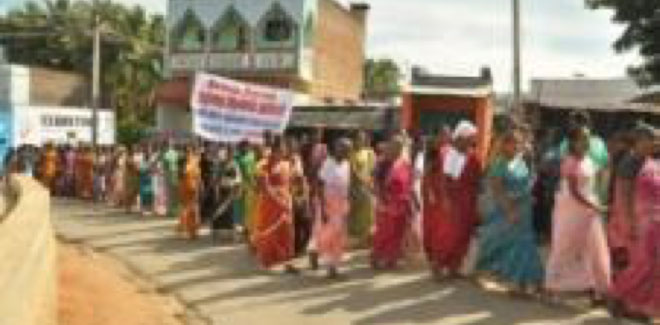
“Educate girls up to Graduation” Procession attended by more than 800 women and children in awareness raising campaign to encourage girls to complete their education to the end of high school. Photo credit: Vasandham Society
Challenges
The prolonged drought is having a serious impact on all agricultural activities, reducing crop quantity and quality, though those with crops to sell have benefitted from the higher prices obtainable in the dry season. By December 2016 the region had only had a quarter of its usual monsoon rainfall, creating problems not only for agriculture but also household consumption. It is also effecting a change of mindset among farmers about how water is managed, and range of techniques being demonstrated by Vasandham Society are being adopted. The types of crops recently grown in the region are not successful with the unreliable water supply, but different and more traditional varieties and types of crops such as those promoted by Vasandham Society are yielding greater results.
Working with the communities to reduce child marriages is difficult as the district child protection units and the violence against women committees are not always aware an underage wedding is being planned. However, as more people become aware of the law around this and how desirable it is for children to complete their education, community support is increasing. This support is adding to the awareness raising workshops being attended by young girls along with the peer support groups.
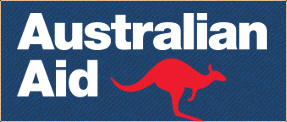
Some of QSA's projects are delivered in partnership with the Australian Government through the Australian NGO Cooperation Program (ANCP).

QSA has signed onto the Australian Council for International Development Code of Conduct See www.acfid.asn.au for details.
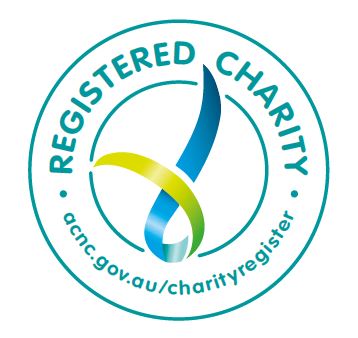
QSA’s policies
If you would like to understand more about QSA’s approach to its development work, this website shows you some details of the various projects currently being supported, and for the theory behind …
If you have a grievance, complaint or dispute find out about our procedures here.
